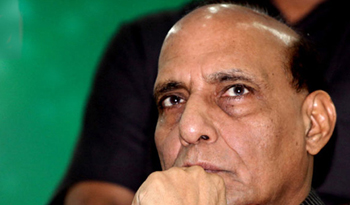Lucknow, Sep 26: In the backdrop of repeated ceasefire violations along Line of Control, Home Minister Rajnath Singh on Saturday said that Pakistan has waged a proxy terror war against India.

He also said that India's borders with Pakistan and China are "very sensitive" and said security arrangements have to be ensured keeping the situation in mind.
Speaking on India's security scenario at a conclave here, he said, "Pakistan has been regularly violating ceasefire agreements, but India has given a befitting reply".
"Pakistan is also waging a proxy terror war against India," he said.
The Home Minister said the Modi government went whole hog against the infiltrators, as a result of which 130 terrorists were killed while sneaking into Indian territory since 2014, compared to 110 in 2013 and 67 in 2012.
Singh said that since the NDA government came to power in 2014, infiltration cases have dropped to 15 this year from 52 in 2014, 264 in 2012 and 277 in 2013.
The minister said increasing defence power of India was not going down well with anti-national elements.
On China, he said the border dispute with that country persists and attempts were being made to resolve it.
Singh said though the boundary with Nepal and Bhutan was peaceful and there was no problem, the borders with Bangladesh and Myanmar were "active".
To a question, he said ISIS will fail to set up any network in India.
Singh also said Left Wing Extremism was a big challenge as 10 states and 125 districts were affected.
The Home Minister said another area of concern was growing cases of cyber crime.
To a query relating to RSS, the senior BJP leader said, "We are and will remain RSS volunteers. The organisation never permits creating differences on the basis of caste and religion."
On opposition criticism that RSS was indirectly running the government, he said the Sangh never sought a report card from the government on its functioning.





Comments
Add new comment